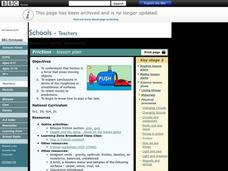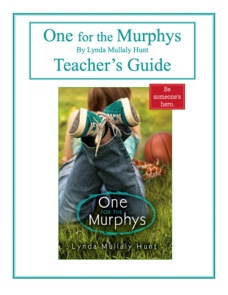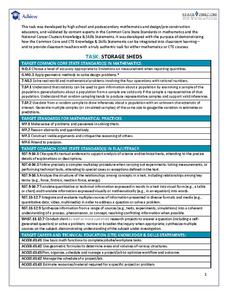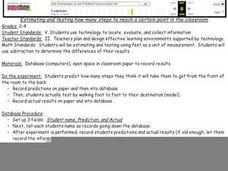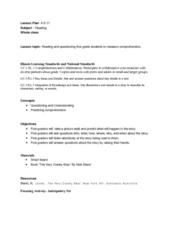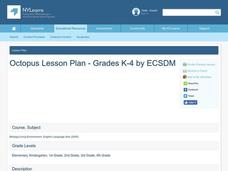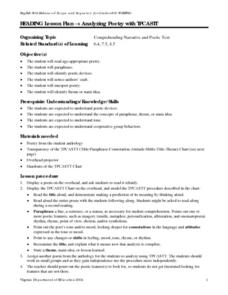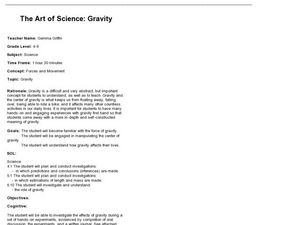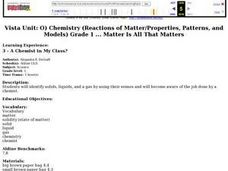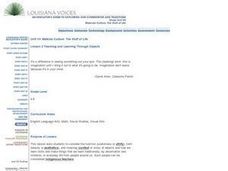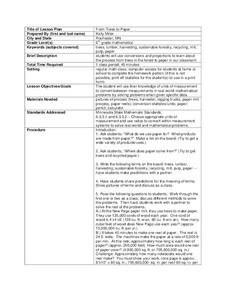Curated OER
Friction
Students review what force. In this science lesson, students determine which surfaces are rough and which are smooth by observing how an object moves on each surface.
Curated OER
Making Hypotheses
Fourth graders practice making hypotheses about what they believe occur as they perform an osmosis experiment in class. This experiment is designed to illustrate how important it is to make an accurate hypothesis.
Curated OER
Coming to America
Students present tableaus showing scenes from The Memory Coat, a book about immigration. For this tableau lesson, students examine the cover of the book and make predictions about what is happening and who the people are. They create...
Curated OER
Going to vs. Will
In this grammar worksheet, learners learn about when they should say "going to" and when they should say "will". They then answer 15 questions using what they learned.
Ohio Department of Education
Observe Then Infer
To develop their skill at drawing inferences from observations, sixth graders rotate through six stations, conduct a series of experiments, make observations, and draw inference from what they observe.
PBS
The Cat in the Hat Activity Exploring Weather
Observe different types of weather right in your classroom! Here, pupils look at clouds, rain, snow, wind, and hot and cold temperatures, and observe these weather patterns at school. They keep track of their observations in a worksheet...
Curated OER
Unit 3: Scientific Writing
Write-on! Demonstrate a writing model and support learners as they write an informational essay on a water resource issue of your (or their) choosing. The lesson plan provides a well-scaffolded summative writing experience that wraps up...
Penguin Books
One for the Murphys by Lynda Mullaly Hunt - Teacher's Guide
Children in foster care face a lot of uncertainty in their lives. A guide for the novel One for the Murphys introduces a main character, Carley, who is thrust into the foster care system. Chapter-by-chapter questions cover key details in...
Curated OER
Recognizing Litter
When does trash become litter? Use this litter awareness lesson to help them understand the importance of trash disposal. Get learners engaged by reading Nancy Loewen's Lady Lulu Liked to Litter (not included). After discussing what...
Achieve
Task: Storage Sheds
Bridge the gap between mathematics and Career Technical Education. Pupils research the cost associated with building storage sheds and analyze possible profit. They build scale models and determine if building and selling the sheds is a...
Curated OER
A New School Year
Looking for a way to incorporate writing on the first day of school? Young writers will predict what the best thing about the new school year will be, note what they hope to learn, and explain how their teacher can help them. They will...
Curated OER
Estimating and Testing Steps
Students predict how many steps they think it will take them to get from the front of the room to the back. They record predictions on paper and then into database and then actually test by walking foot to foot to their destination...
Curated OER
World Cities of 5 Million or More
Students consult online resources to identify and map the world's largest cities and metropolitan areas. They analyze birth rates, settlement patterns and other demographic data and make predictions for the future. They write essays...
Curated OER
Measuring Comprehension in First Graders
Make a prediction! Read The Very Cranky Bear with your first graders, making predictions and asking questions. Consider creating a list of comprehension questions to post while readers are listening to the story. Also consider making a...
Curated OER
Octopus Lesson Plan
Children explore the life of an octopus. They listen to a story, answer prediction questions and share their prior knowledge of animals. Young scholars observe the defense mechanism of the octopus. They create an imaginary defense...
Curated OER
Analyzing Poetry with TPCASTT
Middle schoolers read a poem and complete a TPCASTT chart. They make a prediction about the title (T) , paraphrase each line (P), identify poetic devices and nuances (C-connotation), explore mood and tone (A-attitude), point out shifts...
Curated OER
The Art of Science: Gravity
Through a series of experiments and demonstrations, fifth graders will learn about gravity. They will make predictions, drop various objects, write down their observations, and try to understand gravity through balance. This lesson seems...
Curated OER
A Chemist in My Class?
First graders in kindergarten science class discuss matter. They make predictions and then identify mystery items in brown paper bags as either solid, liquid, or gas by using their senses. They discuss that a chemist is a scientist that...
Curated OER
Planets
First graders study the planets in the solar system. In this planets lesson, 1st graders read Planets, then create a mobile containing all of the planets in the correct order. Students will label the planets with descriptive words.
Curated OER
Predicting a Mystery's Solution
Who killed Sam Westing? Model for your class members the components of a good prediction, and how to use these components to predict a mystery's solution. Class members use what they have learned to craft predictions while reading Ellen...
Curated OER
Atmospheric Pressure Interactive Learning Demonstration
Students predict what happens to the balloon as the water in the flask boils. For this physics lesson, students explain why they made such prediction. After the demo, they give some real life examples of this concept.
Curated OER
How Do They "Whether" the Weather
Sixth graders are engaged in learning about weather systems, weather patterns and how to create a local forecast through a KCTS video called: "How Do They "Whether" the Weather?" Students actively learn how movements in atmosphere are...
Curated OER
Teaching and Learning Through Objects
Students identify and interpret the function, usefulness or utitlity, form, beauty or aesthetics, and meaning, context or story, of objects and how they learn new skills and make things that they learn traditionally, by observation and...
Curated OER
From Trees to Paper
Sixth graders investigate logging and the process of paper making. In this forestry lesson, 6th graders analyze pictures of trees being processed into the paper they use everyday. Students solve and create math problems based on...


